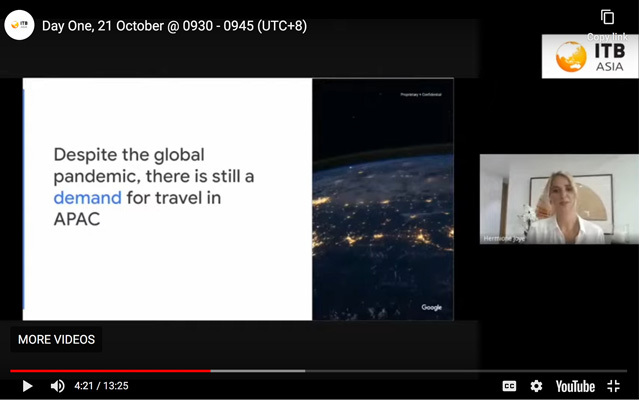More consumers are gravitating towards OTAs as contactless transactions and information transparency race to the fore of the Covid-19 world, edging businesses towards the ever-increasing need for digitisation.
Since the onset of the pandemic, there has been an “acceleration of preference towards OTA” platforms, described Hermione Joye, sector lead, travel and vertical search APAC, Google. For instance, Chinese consumers have more than doubled their bookings via OTAs during the Covid-19 period, posting a marked shift away from direct sellers.

“This is because (OTAs) clearly articulated what was happening around China when it came to travel restrictions and opportunities, as well as what they were doing for safety measures,” said Joye.
Speaking at a keynote session at ITB Asia 2020 Virtual on October 21, Joye stressed the importance for companies to improve their digital presence, as the modern traveller is “incredibly digitised” and will be partial to platforms that can create a personalised booking experience.
Success also hinges on adapting and responding to new needs quickly; an approach that has helped airlines secure increased direct traffic. Joye advised businesses to create new strategies based on how each market is currently adapting to the pandemic.
In addition, she urged businesses to provide consumers with relevant and current information clearly. “You need to improve your digital user interface – make sure it’s seamless and end-to-end – and make sure the consumers really understand the safety programmes, so that they feel comfortable booking with you.”
The need to instill trust and traveller confidence through messaging and tourism content is also emphasised by fellow keynote presenter Angel Llull Mancas, vice president & managing director, Asia Pacific with Booking.com.
Mancas emphasised flexible cancellation policies to give travellers’ piece of mind, as “we cannot predict when the next wave will come or how borders will react”.
Some travel trends to note, according to Mancas, include last minute bookings as well as bookings for future travel dates; and a growing preference for locations that are less populated as well as nature-based attractions such as beaches and mountainous areas. In response to these trends, Booking.com has improved on its search functions to make it more intuitive for users to find their preferred holiday locations.
He also foresees that remote working may result in a new type of customers in the years to come. These are people who choose not to work from home, but from an alternative setting, such as a beach or restaurant, where they can stay connected to their colleagues through Wi-Fi. – Additional reporting by S Puvaneswary




















